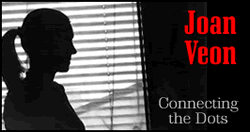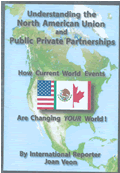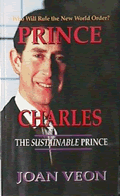Other
Veon
Articles:
US Leaders Highlight World Economic Forum Agenda
Global Taxation And Tax Harmonization
Does The
Global Economy Need a Global Currency?
REINVENTING GOVERNMENT
By
Joan Veon
July 18, 2007
NewsWithViews.com
The Seventh Global Forum on Reinventing Government recently concluded in Vienna. For the first time since this type of meeting was organized in 1999, the United Nations hosted a conference on changing the structure of government worldwide to be more democratic. What does it mean to have the United Nations in charge of changing the structure of national government worldwide? We must primarily consider the actions of President Clinton who began the reinventing government process in the United States. .
In 1989 Arkansas Governor Bill Clinton became chairman of the Democratic Leadership Council-DLC. The DLC is also affiliated with the Progressive Policy Institute and the Smith Institute of London and was created to develop the �third way� philosophy and governing agenda. When he ran for the presidency, Clinton promised change and was the first to campaign on the concept of reinventing government.
On March 3, 1994, Clinton announced, �We intend to redesign, to reinvent, to reinvigorate the entire national government� (Washington Times, 3/4/94). In his January, 1995 State of the Union address, Clinton announced a �New Covenant� which he said was
A new set of understandings for how we can equip our people to meet the challenges of the new economy, how we can change the way our government works. The old way was centralized here in Washington. The New Covenant must take hold in the communities all across America. We should rely on government as a partner.
The president kept his word and created the National Performance Review in 1993 which came up with several reports. They reported that over a five year period of time, the U.S. Government eliminated 250 outdated government programs, slashed more than 160,000 pages of regulations, cut more than 640,000 pages of internal rules, helped balance the federal budget for the first time in 30 years and cut more than 351,000 employees. However, reinventing government is more than just making government more efficient.
In 1999 when Vice President Al Gore hosted the first annual meeting on �Reinventing Government� at the State Department, he said overly centralized government was an impediment in the 21st high-speed, high-tech economy. He explained, �To promote prosperity in the new economy, nations will have to reinvent their economic and regulatory institutions to respond to citizens and markets in a more flexible and efficient manner.� Various countries testified as to what they were doing to reinvent government in their country.
Various books and reports started to pop up. Some of them included: Our Common Future by the World Commission on Environment and Development in 1987, Creating a New Civilization�The Politics of the Third Wave in 1994 by Alvin and Heidi Toffler, An Agenda for Peace by Boutros Boutros-Ghali in 1995, and Our Global Neighborhood by The Commission on Global Governance in 1995. For our purposes we will address the Toffler�s book and the report, Our Global Neighborhood.
In Toffler�s book, Speaker of the House Newt Gingrich wrote a very glowing forward in which he explained that he began working with the Toffler�s in the early 1970s on a concept called �anticipatory democracy� when he was an assistant professor at West Georgia State College. Gingrich wrote that he has worked with them to develop a �future-conscious politics and popular understanding that would make it easier for America to make the transition from the Second Wave (industrial revolution) civilization�which is clearly dying�to the emerging, but in many ways undefined and not fully understood Third Wave civilization.� The Toffler�s state that a centralized form of bureaucratic government is outdated in the new Third Wave and that �more appropriate political structures� are needed because �In all likelihood it will require a protracted battle to radically overhaul the United States Congress, the House of Commons and the House of Lords, the French Chamber of Deputies, the Bundestag, the Diet, the giant ministries and entrenched civil services of many nations, their constitutions and court systems�in short, much of the unwieldy and increasingly unworkable apparatus of existing representative governments. Nor will this wave of political struggle stop at the national level. Over the months and decades ahead, the entire �global law machine��from the United Nations at one end to the local city or town council at the other--will eventually face a mounting, ultimately irresistible demand for restructuring.� The Toffler�s say that the Third Wave society of the internet age must depend on �the principle of �semi-direct democracy��a shift from depending on representatives to representing ourselves.�
Toffler�s book was followed by the release of Our Global Neighborhood which provided an independent report, we are told, in which the Commission wrote, �[B]ecause of the changes of recent years, we are at a new time, that we need a new order in world affairs, a new style of managing our relations on this planet and a new way of relating to the planet.� The Commission provided a definition of �governance� which is �[T]he sum of the many ways individuals and institutions, public and private, manage their common affairs.� They explain that �when the United Nations was created, nation-states, some of them [with] imperial powers were dominate.� They expanded the definition of governance to �global governance� which is �the governance of diversity, not uniformity; it is governance through democracy, not through dominion; it is governance that is multi-layered, not from the mountain-top. It is necessarily governance as an un-centralized system.� In short, their definition of global governance is exactly what those who want to reinvent government are talking about! It builds on the Toffler theory of �more inclusive and participatory democracy.� All of this is in the making�there is no pattern in all of history for what they are proposing! In short, the Commission writes, �The creation of adequate governance mechanisms will be complicated. There must be an agreed global framework for actions and policies to be carried out at appropriate levels.�
At the first meeting on reinventing government, then Secretary of State Madeline Albright testified that the State Department had been reinventing itself and World Bank President Jim Wolfenson described how the World Bank was reinventing itself to help countries with their public sectors. In the UK, the Blair government was also reinventing itself and was the vision of the Blair government. Their program, �Modernizing Government�, according to Minister for the Cabinet Office Jack Cunningham, was dividing the work of government so that tasks �were more clearly defined. Some tasks were privatized, others were contracted out, or devolved to new, clearly focused agencies, and performance-related pay was introduced.� Furthermore, the barriers between the different organizations of government were removed so they could work together. They created a new performance and innovation unit to determine how to better deliver government�s objectives at the local level. Britain put in place family leave and launched new partnerships across government to deliver their policy pledges. They also set a target that by 2002, at least 25% of all government services should be capable of being delivered by electronic means: banking, the Internet, digital TV and telephone. The UK passed their own Freedom of Information Act and a people�s panel of 5,000 to nationally represent their citizens to tell them what they think of government and their services.
Other countries testified of decentralizing government with the prime minister having the greatest power to coordinate the ministers of government and to rule them. Many former Comecon countries were adopting market based democracy rules, privatizing government services by changing the constitution to end state monopolies. Canada testified that they have been �downsizing, privatizing, deregulating, and so on.� Jocelyne Bourgon, Canada�s Clerk of the Privy Council and Secretary to the Cabinet testified on reinventing government, �It means re-modernizing the role of government. What are the new roles that government will be called upon to play to adapt to a global economy, knowledge-based society, information age, digital age and so on? New roles that did not exist before. Like all of you, we�ve been experimenting with partnerships, strategic alliances with the private sector, academy, community, NGO, single society.�
Common elements of reinventing government included public-private partnerships, de-regulating, privatizing and moving to electronic government. In an interview I did in Vienna with an official of Microsoft, he told me that at some point, there would be no need for a physical Congress for it would all be done electronically�within a country and between countries!
But let us consider globalization. Globalization is the process of tearing down barriers between the nation-states. When we consider that with the establishment of every international institution since 1944, the economic, political, trade, and legal barriers are gone. While I understood that Y2K wired the world, I did not carry it far enough to electronic government! Furthermore, 9/11 tore down the most sensitive barriers: the military and intelligence. Basically the barriers between countries, for the most part, are gone.
Therefore what is left? To harmonize, integrate and reinvent government! Back in 1989, reinventing government became the mantra of the Democratic Leadership Council and the Smith Institute of the U.K. Eighteen years later it has been shifted to the United Nations. The First Global Forum on Reinventing Government was sponsored by the World Bank, the Ford Foundation, the John F. Kennedy School of Government at Harvard, the Organization for Economic Cooperation and Development-OECD, and the Brookings Institute, all bastions of a progressive and democratic form of government, and not a republican form of government!
I find it fascinating that it was Margaret Thatcher who decided to adopt the economics of Frederic von Hayek who advocated smaller government through privatization of state assets. President Reagan agreed and during his term in office he adopted smaller government when he declared, �Get government off our backs.� Little did the American people know that he was putting the foundation in place for big business to come in and buy up government through privatization and public private partnership. Now we see that the next level in destroying the nation-state as we know it was for Bill Clinton and Tony Blair to make reinventing government the centerpiece of their government. Today, based on the joint legacy of Thatcher/Reagan and Clinton/Blair, we have the infrastructure assets of government being sold: roads, bridges, water, electricity, sewer systems, airports, etc. As these assets are sold off, the citizens are being robbed of investments in government their tax dollars made.
So just what are we witnessing in the 21st Century? Bottom line is that with the barriers between the nation-states gone and with the shift from the congresses and parliaments of the world to the local level along with the implementation of public-private partnerships which is the buy-out of government by business, the form that is really being put in place is global corporate fascism. With every new public-private partnership, representative government diminishes. While we are told civil society will have a voice, that voice is only limited to its financial power. Who has the power when the representatives of public-private partnership are sitting around the corporate table? Is it the bankrupt governments? Is it civil society? Or is it big business?
Furthermore, in a world without barriers and borders, we have the end of the nation-state as we have known it. As the world moves toward a global currency and a global tax, America will move away from the Constitution and Bill of Rights. As the Toffler�s wrote, �Over the months and decades ahead, the entire �global law machine��from the United Nations at one end to the local city or town council at the other--will eventually face a mounting, ultimately irresistible demand for restructuring.� But no one can tell us what it really means when governments are stripped of assets, citizens become customers, and national government is no longer.
|
Subscribe to the NewsWithViews Daily News Alerts! |
Bill Clinton is no George Washington and Hillary is no Betsy Ross. Unfortunately those who want a world governmental system or the reinventing of government are those who really want the world put back under British rule: the Royal Institute for International Affairs, the Council on Foreign Relations, the Carnegie Endowment for International Peace, and others. The world which is being reinvented is not being reinvented for you and me. As one man stated at the World Economic Forum several years ago, �The world depends on the U.S. to get it right and when the U.S. does not have it right, the world does not have it right.� Where are the midnight riders who cried �The British are coming!� when danger was mounting during our fight for freedom? Freedom, when lost, is lost forever. We are no longer fighting the British, we have joined them!
Please
refer to my book, The
United Nations' Global Straitjacket in which I spend a whole chapter
on reinventing government and my new DVD Public
Private Partnerships.
� 2007 Joan Veon - All Rights Reserved
Sign Up For Free E-Mail Alerts
E-Mails
are used strictly for NWVs alerts, not for sale
 Order
Joan Veon's book;
Order
Joan Veon's book;
"The
United Nations'
Global Straitjacket"
Joan Veon is a businesswoman and international reporter, having covered 75 Global meetings around the world in the last ten years. Please visit her website: www.womensgroup.org. To get a copy of her WTO report, send $10.00 to The Women's International Media Group, Inc. P. O. Box 77, Middletown, MD 21769. For an information packet, please call 301-371-0541
E-Mail: jveon@adelphia.net
Common elements of reinventing government included public-private partnerships, de-regulating, privatizing and moving to electronic government.














